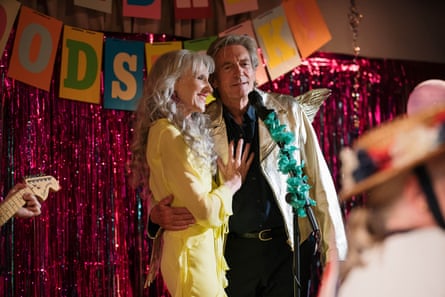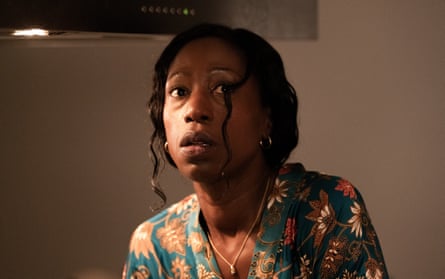In March 1977, BBC One screened Spend, Spend, Spend, a single drama about a woman whose husband won the pools, a weekly competition to guess football scores. This week, Channel 5 will show Big Winners, a one-off play about the national lottery turning a couple into multimillionaires.
The parallel, intentional or not, is appropriate. Jack Rosenthal’s Spend, Spend, Spend, which won a Bafta, was one of the standout successes of Play for Today, the prime-time drama strand that ran on the BBC’s main channel from 1970 to 1984. Big Winners, written by Martha Watson Allpress, is included in 5’s four-play revival of the Play for Today franchise.
With only three channels available for watching (until the arrival of Channel 4 in 1982), the original BBC series reached many millions. It is often remembered as a slot for new TV writers and did develop several – including David Hare and Stephen Poliakoff – but also drew on established TV dramatists (Dennis Potter, Alan Plater), famous stage playwrights (John Osborne) and novelists (Fay Weldon, Ian McEwan, William Trevor). From its opening sample, the new run showcases newer writing talent.
Under Ben Frow, its director of programming, 5 has taken to rebooting shows from the last century to court an older audience that the first four British terrestrial channels may be neglecting. Remakes include All Creatures Great and Small, Dalgliesh and Challenge Anneka. But while those revivals looked very similar to the originals, Play for Today’s relationship with its ancestor is more complicated. As well as Spend, Spend, Spend/Big Winners, each of the 2025 quartet has a twin in the earlier collection.

The four new dramas start on 13 November with Never Too Late, written by Simon Warne and Lydia Marchant, in which Anita Dobson plays a widow encountering flirtation in a rest home. It’s a more mature version of the plot of Colin Welland’s 1973 Play for Today, Kisses at Fifty. David Whitehouse’s new drama A Knock at the Door, which casts Alan Davies as a “national treasure” visited by a young, accusatory male, has a tense premise similar to Barrie Keeffe’s 1977 Gotcha , in which a pupil locks his bully of a PE teacher in a cupboard and threatens to set him on fire. And Special Measures by Lee Thompson, with Jessica Plummer as a teacher juggling extreme pressures on the day of an Ofsted inspection, might be a grandchild of John Challen’s Headmaster (1974), in which a traditional head tries to adapt to a changing education system.
If not a deliberate shadowing, these parallels most likely arose because any shortlist of mainstream viewer concerns, then and now, includes money, sex, violence and education. And there is a significant difference between yesterday’s Play for Today and today’s. The first version was politically ideological to the degree that rightwingers satirically called it “Plays for Trotskyists”. Several memorable editions – Jim Allen’s The Spongers (1978) and United Kingdom (1981), and Trevor Griffiths’ All Good Men (1974) and Country (1981) – were explicitly socialist critiques of British society.
Admirers of the original series will crave plays about asylum seekers or a group of Tory voters who have defected to Reform. But the days of such narratives in peak-time TV are probably over. The four new plays focus on the well-heeled middle classes and feel essentially apolitical. That reflects a broader change in culture; political drama tends more towards even-handedness, as represented by the work of James Graham.

Two of the four new plays – Big Winners and Never Too Late – count women among their writers, a proportion that differs significantly from the original. Play for Today’s writers were predominantly male, although some women – Paula Milne, Julia Jones, Carol Bunyan, among others – made significant contributions when allowed.
Another potential departure from the BBC series is the possibility that this is not focused solely on one-off plays. Certainly, the opener, Never Too Late, ends with a plot twist, moving the story to a new location, that could seed a six-part comedy-drama at the very least. And viewers might be lured to it, given the cast attached: Dobson, Nigel Havers and Tracy-Ann Oberman, the latter in a small role with potential to expand. Big Winners and Special Measures also have series potential, although they would bump into the memory of ITV’s At Home With the Braithwaites (2000-03) and the BBC’s Waterloo Road (2006-15, 21-present). Perhaps, though, Frow wants to add versions of those to his nostalgic roster of old hit shows.
The original Plays for Today certainly featured a few shows that went on to have a longer life. Among the 300 or more instalments were John Mortimer’s story of a shabby barrister, Rumpole of the Bailey (1975); Alan Bleasdale’s story of Liverpudlian road-layers, The Black Stuff (1980), and his teenage drama Scully’s New Year’s Eve (1978); Philip Martin’s Gangsters (1975), featuring civil war between Brummie thugs; and Challen’s Headmaster, an early warning of Britain’s dangerous educational inequalities. All became series, with Rumpole running to seven seasons, although on ITV rather than the BBC.
Curiously, two Plays for Today later became West End musicals: Spend, Spend, Spend and Bar Mitzvah Boy (1976), both by Rosenthal, a colossus of the slot who also wrote the poignant wartime piece The Evacuees. And the most revered Play for Today ever – Mike Leigh’s Abigail’s Party (1977) – started as a stage play, as did another Leigh contribution to the series, almost as popular: Nuts in May (1976).

If the aim is for the four new Plays for Today to remain as one-shot dramas, it would be daringly contrary to the prevailing TV culture. Streamers want “long content” to sustain subscriptions and feed multi-season box sets on websites. Even a four-parter, such as Adolescence, was considered worryingly short by Netflix until that quartet of episodes made such a spectacular impact.
The original Play for Today was remarkable for its scale: 20 or so dramas a year for 14 years. Inevitably, with that volume, the “right to fail” – a popular concept in culture at the time – was frequently claimed. This was how TV worked in those times of financial and artistic freedom, and it was important: if each series producer had been asked in advance to pick the six from each annual 20 that were really good, plays now feted would never have been made, because hits are often unpredictable.

However, if Frow announced he was making 20 single plays in 2025 or 26, his bosses would send him to a doctor. The four we have are an impressive start: in particular, the acting and writing in Never Too Late are a joy, and A Knock at the Door has a menacing premise.
Given 5’s positioning as 1980s TV in exile, it’s unsurprising that two of the main characters are octogenarians and two septuagenarians. This is demographically sensible and a commendable stand against ageism – although, if it persists, it may become a limitation. Cinematography is also frank about the realities of some older bodies. Davies in A Knock At The Door and Michael Fenton Stevens in Never Too Late boldly take their shirts off, camera angles sparing nothing, the latter scene leading to a lovely punchline.
As long as not too many of the scripts are pilots in disguise, the revival of a strand that was once a symbol of British television drama’s ambition and confidence feels welcome.

 3 months ago
108
3 months ago
108

















































